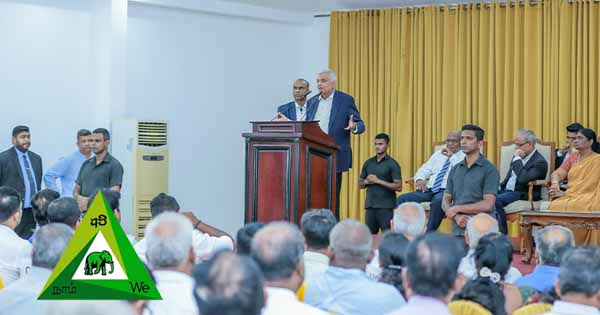President Highlights High Economic Potential in the North for National Development

- Academics and Professionals Urged to Drive New Economic and Political System Forward.
- President Stresses Harmony and Equality in Jaffna.
- President Foresees Greater Opportunities with Economic Growth in Tamil Nadu.
President Ranil Wickremesinghe noted that the people of the Northern Province, including Jaffna, have been facing economic difficulties for a long time. However, he pointed out that there is significant economic potential in the province that can be utilized.
He stated that the government has planned to use these opportunities to contribute to the economic growth of the entire country, including the Northern Province.
President Ranil Wickremesinghe made these remarks during a meeting with scholars, professionals, and entrepreneurs of the Jaffna district, today (02) at the Valampuri Hotel, Jaffna.
The President pointed out that the country’s economic and political system had collapsed due to various promises made on election platforms and borrowing to fulfil them. He emphasized that it is the responsibility of all scholars, professionals, entrepreneurs, and others in the country to contribute to the advancement of the economy through a new economic and political system, ensuring that the same mistake does not happen again.
President Wickremesinghe stated that the ethnic problem in the country should be resolved urgently, emphasizing the importance of treating everyone equally. While recognizing the prominent place of the majority Sinhalese and Buddhist people, he stressed the need for equality between ethnic and religious groups, as well as between women and men.
Additionally, the President highlighted the importance of promoting the Tamil language alongside Sinhala. He noted that with the anticipated economic growth in Tamil Nadu in the near future, Tamil-speaking Sri Lankans would have unique opportunities that others might not have.
Addressing the gathering President Ranil Wickremesinghe further elaborated,
“Initially, there was an agreement to impose taxes at a certain level under the program with the International Monetary Fund (IMF). However, the subsequent government reduced the taxes based on an election promise, leading to a decrease in government revenue and causing the International Monetary Fund to withdraw from the program. We cannot afford to repeat that mistake. As we move forward as a country, we must also change our political system.
During the last economic crisis, no one was willing to take on the role of Prime Minister. It became challenging to find someone capable of leading the country. After the president left, I was told to resign, but no one wanted to accept the responsibility. This highlights the collapse of the country’s economic and political system, which was built on borrowing and unfulfilled promises.
We need to rethink our political system and make difficult decisions. The country requires a new political system for a better future. This change isn’t limited to the constitution or leadership; it also necessitates courageous leaders who can take responsibility.
We must all embark on this journey together and resolve the Sinhala and Tamil ethnic issues as soon as possible. While the majority Sinhalese and Buddhist people hold a prominent position, it is crucial to treat everyone equally, ensuring equality among ethnic and religious groups as well as between women and men.
Women, who represent about half of the population, lack proper representation in parliament, and this must be addressed. We should promote both the Sinhala and Tamil languages. With the upcoming economic growth in Tamil Nadu, Tamil-speaking Sri Lankans will have opportunities that others might not.
We should develop all the provinces of the country as a unified whole. During my tenure as a minister, Jaffna was one of the major cities, but it later became underdeveloped. Now that the war is over, it is time to focus on developing Jaffna and the Northern Province.
We should grant more power to provincial councils to facilitate regional development, such as poverty alleviation and agricultural modernization.
We are working to gazette the National Land Commission and the Truth and Reconciliation Commission. Additionally, we aim to amend the Provincial Council election system to include representation for women and youth and to allow members of Parliament to serve in both the Provincial Council and Parliament simultaneously. This will integrate the central government with the provincial administrative structure.
Jaffna holds great potential in renewable energy, tourism, and agriculture. We have planned to develop investment zones and contribute to the country’s development by expanding Trincomalee port and establishing land connectivity with India.
The people of Jaffna and the Northern Province have suffered for a long time, but this province has immense potential that we should harness. The country needs a change; we cannot continue in the old way. The existing system must change for a better future. As doctors, lawyers, and civil society leaders, you must take the lead.
We should all work together for a new Sri Lanka. Although the challenges we faced in 2022 were daunting, we confronted them with strong determination. Let’s overcome the challenge of developing our country. I invite everyone to think anew and join in building a new community.
The President responded positively to the questions raised by professionals and entrepreneurs, who also shared their ideas and suggestions for the future development of the country.
The event was attended by Northern Province Governor P. S. M. Charles, State Ministers Dr. Suren Raghavan and K. Kader Masthan, MP Angajan Ramanathan, Senior Adviser on National Security and Chief of Presidential Staff Sagala Ratnayaka, former Minister Ravi Karunanayake, former State Minister Vijayakala Maheswaran, and several other guests.





